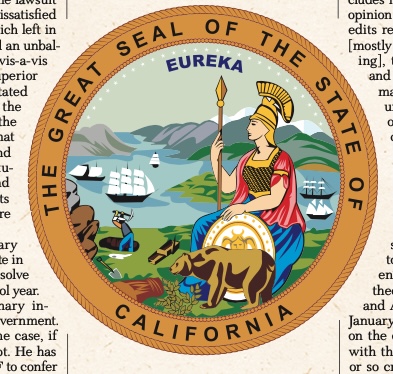The California superior court in Sacramento ordered on April 21 that an expedited hearing schedule be determined in the lawsuit of the Hindu American Foundation, HAF, against the California State Board of Education, SBE, over the adoption of sixth grade social studies’ books for next school year. The lawsuit was brought when Hindus were dissatisfied with the book review process, which left in place inaccuracies, distortions and an unbalanced presentation of Hinduism vis-a-vis other religions. In his ruling, Superior Court Judge Patrick Marlette stated twice that he was “troubled ” by the SBE review process in adopting the books. HAF had charged that what is supposed to be a documented and transparent system of review actually progressed through 2005 and 2006 in a haphazard manner. Parts of the review, HAF contends, were contrary to California state law.
HAF’s request for a preliminary injunction was rejected by Marlette in favor of a speedy schedule to resolve the complex case prior to the school year. It would be rare for a preliminary injunction to be issued against a government. Marlette could have dismissed the case, if he felt it had no merit, but did not. He has instead ordered the SBE and HAF to confer and propose a schedule for hearing the case expeditiously, before the textbooks in question are distributed this fall. He also recommended the two parties explore any possible resolution of the issues between them.
Important testimony in the case was given by Stan Metzenberg, a member of the SBE’s Curriculum Commission. At their December 2 meeting, the Commission sided with the Hindus on most issues in the textbooks. Normally, their recommendation would be adopted by the SBE, but in this case were not. The SBE contended that its own Curriculum Commission failed to follow the guidelines laid out for it in reviewing the proposed Hindu “edits ” (as the changes are called). As a result, the SBE held a separate, closed-door meeting on January 6 to again review the edits, and arrived at a different set of recommendations, one less acceptable to Hindus.
Metzenberg, a professor at California’s Northridge University, contends in his testimony that the Commission did indeed follow the Board’s instructions. He is no stranger to textbook review, having been involved in improving the science curriculum in California and testifying before the US Congress on the same issue. During the December 2 meeting, Metzenberg, a molecular biologist, took issue with the claims that there was an “Aryan Invasion ” in ancient times in India–one of the main points of dispute with the texts. He took it upon himself to read the studies that had been done on the genetic makeup of individuals of the Indian subcontinent, and reviewed them with his wife, also a professor at Northridge and an expert in human genetics. At the meeting, he sided with the Hindus against the recommendation of several Western non-Hindu Indologists. In his testimony, he states, “My opinion as a scientist, and what I recommended to my fellow commissioners on December 2, was that Aryan Invasion Theory is not easily supported by genetic evidence, and, in fact, the preponderance of more recent genetic evidence would tend to rule out a major invasion of Europeans. This is why I believe that it would be inaccurate to portray Aryan Invasion Theory as a fact in California textbooks. Our [the Commission’s] addition of a qualified statement, ‘Aryan invasion theory has been contradicted by some scholarly evidence,’ is a sensible solution.”
Another declaration submitted is that of Dr. Shiva Bajpai, who was hired by the Board as an expert in Indian history to review the proposed edits. Upon the entry of the non-Hindu Indologists in December, he was sidelined in the process. At the critical January 6 meeting, in which all contested edits were reviewed again, he was told that changes would only be made if he and Dr. Witzel of Harvard, leader of the non-Hindu Indologist group, agreed. This effectively gave veto power over the edits to Dr. Witzel, with the result that significant edits Hindus sought were not made. Bajpai concludes in his testimony, “It is my view and opinion that if the textbooks reflect only the edits recommended by the subcommittee [mostly the results of the January 6 meeting], those texts will portray Hinduism and Indian history inaccurately and in a manner that puts Hinduism in a rather unfavorable light. It is my view and opinion that the texts continue to require changes to make them comply with the standards imposed by law for textbooks in California.”
On April 21, Judge Marlette requested the groups explore a settlement. The charges brought against the Board by HAF are fairly extensive, ranging from improper process to the specifics of five issues: women’s rights, caste and untouchability, theology, comparison with other faiths and Aryan Invasion. Toward the end of January, prior to the final Board decision on the edits, HAF submitted a document with their recommendation on two dozen or so critical edits related to these five issues. This submission was rejected by the Board, which led to HAF’s filing the lawsuit. The possibility remains that the Board and HAF could revisit this list of edits and try to work out a solution that does not hold up the entire textbook printing process, as a trial might. A solution based on these specific edits would not address the larger problems with the texts, but it would establish the rights of Hindus to at least an equal part in the process with Western, non-Hindu Indologists, some of whom appear to regard Hinduism with disdain. If, however, HAF prevails at trial, then court-ordered changes to the books to bring the treatment of Hinduism on par with the other religious would necessarily be quite extensive, as the court would not be limited to the relatively small corrections allowed in the Board’s review process.
